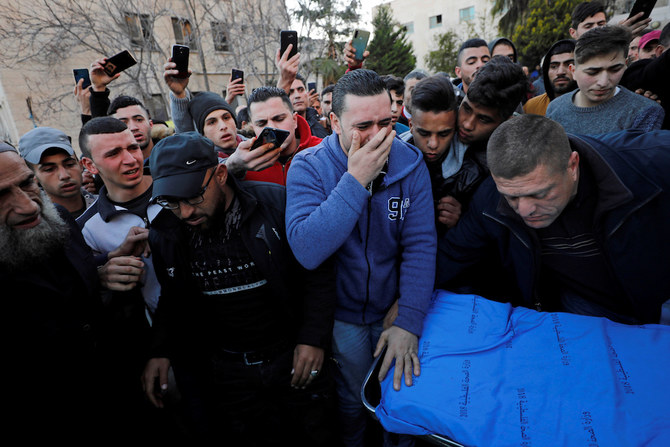
- ARAB NEWS
- 18 Jul 2025

JERUSALEM: Israeli forces shot and killed a 17-year-old Palestinian during clashes with demonstrators in the West Bank on Wednesday, the first death since tensions rose following the release of President Donald Trump’s Mideast plan, according to Palestinian officials.
The shooting came hours after Israel struck Hamas targets in Gaza in response to rocket fire toward Israeli communities overnight.
The teenager was killed in Hebron, where a few hundred hard-line Jewish settlers live in a heavily guarded enclave in the heart of a Palestinian city. Violent protests have broken out across the occupied West Bank since the Trump plan was unveiled last week.
The Palestinian health ministry said Mohammed Al-Haddad was shot in the chest and succumbed to his wounds after being taken to a hospital. There was no immediate comment from the Israeli military.
The Palestinians have roundly rejected Trump’s Mideast proposal, which offers them limited self-rule in scattered chunks of territory with a capital on the outskirts of Jerusalem while allowing Israel to annex large parts of the West Bank.
Protesters have burned US and Israeli flags as well as posters of Trump and Israeli Prime Minister Benjamin Netanyahu. Stones and firebombs have been hurled at Israeli troops, with one exploding and lightly wounding a soldier. The Israeli military has instructed troops to “contain” the protests and not respond forcefully, concerned that Palestinian casualties would set off further violence.
In Gaza, the military said it targeted a Hamas weapons manufacturing site. There were no reports of casualties. The exchange comes amid an uptick in cross-border rocket and “explosive balloon” launches from the Hamas-controlled territory.
The Gaza Strip has been relatively calm in recent months as part of an informal truce between its Hamas rulers and Israel, but tension has increased since President Donald Trump unveiled his plan, which heavily favors Israel, last week.
Under the plan, Israel would be allowed to annex all Jewish settlements in the West Bank, as well as the strategic Jordan Valley. The Palestinians were offered limited self-rule in Gaza, parts of the West Bank and some sparsely populated areas of Israel in return for meeting a long list of conditions. The Palestinians, as well as much of the international community, view the settlements in the West Bank and annexed east Jerusalem — territories seized by Israel in the 1967 war — as illegal and a major obstacle to peace.
Hamas had recently curbed rocket fire from Gaza and rolled back weekly protests along the frontier that had often turned violent. In return, Israel eased the blockade it imposed with Egypt on Gaza after they seized power from forces loyal to the Palestinian Authority in 2007.
Hamas rejected the Trump plan and vowed that “all options are open” in responding to the proposal, but the group is not believed to be seeking another war with Israel.
Following the latest rocket fire, the military said it viewed the incident with “great severity and is prepared for various scenarios.” It said the zone available for fishing off the coast of the Palestinian territory would be tightened from 15 nautical miles to 10 in response to the rocket fire and explosive balloons.
Meanwhile, the Western-backed Palestinian Authority based in the West Bank announced it has stopped importing Israeli vegetables, fruits, beverages and mineral water. That’s the latest step in a brewing trade war with Israel that began in September, when the Palestinians decided to stop importing beef from Israel.
The P.A. claimed most of the 120,000 head of cattle the Palestinians import monthly from Israel was itself imported and that they therefore prefer to import directly from abroad. The move appeared aimed at reducing the Palestinians’ economic dependence on Israel.
Shortly after the September announcement, Israeli cattle ranchers saw a drop in their market and pressured Israeli authorities to take action. Defense Minister Naftali Bennett retaliated with a ban on Palestinian beef and other products, triggering the Palestinians to expand their boycott.
The Palestinian minister of economy, Khaled Al-Osaily, said the latest decision was meant to pressure Israel into revoking its ban on importing vegetables. He said the P.A. annually imports from Israel some $300 million worth of fruits and vegetables while exporting only $55 million.
“We told them this decision has come as a response to the Israeli decision and will be revoked the moment they back off,” Al-Osaily said. “We have chosen these products since we have an alternative or we can live without them.”
AP